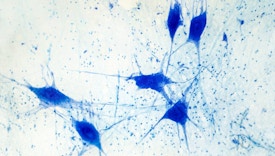
Dorothy Schafer, Ph.D.
Associate Professor, University of Massachusetts Chan Medical School
SFARI Investigator, SFARI Scientific Review Board WebsiteDorothy Schafer is an associate professor in the Department of Neurobiology at the University of Massachusetts Chan Medical School. She has a longstanding interest in understanding how neuron-glia interactions regulate nervous system development and determining how these interactions become disrupted in disease.
This includes her graduate training at the University of Connecticut Health Center in myelinating glia-axon interactions. It also includes her postdoctoral work at Boston Children’s Hospital/Harvard Medical School, where she published one of the seminal papers establishing a role for microglia and immune molecules in synapse development in the healthy brain. In these studies, it became clear that microglia were important regulators of neural connectivity by pruning away a subset of less active synaptic connections in the developing visual system and in disease. Since then, Schafer’s lab has further established microglia as key regulators of synapse remodeling in the healthy, developing brain, during neurodevelopmental disorders and during early phases of neurodegeneration.
The overall goal of the Schafer laboratory is to achieve a deep, mechanistic understanding of how microglia, a vastly understudied glial subtype and resident central nervous system macrophage, regulate structural and functional neural circuits in health and disease. Towards this goal, her lab uses a combination of high- and super-resolution static imaging, 2-photon live imaging in awake, behaving mice, spatial transcriptomics and cell-type-specific molecular genetics to further address how microglia and other glial cells modulate synaptic connectivity in health and disease.
Together with the labs of Daniel Geschwind and Michael Gandal, she now plans to use a spatial transcriptomic approach called MERFISH (multiplexed error-robust fluorescence in situ hybridization), to gain an unprecedented new view of gene expression changes in postmortem brain tissue samples from individuals with autism spectrum disorder and neurotypical individuals. They aim to understand how such gene expression changes relate to cortical laminar distribution, changes in glial cell reactivity and positioning in relation to neuron subtypes.
